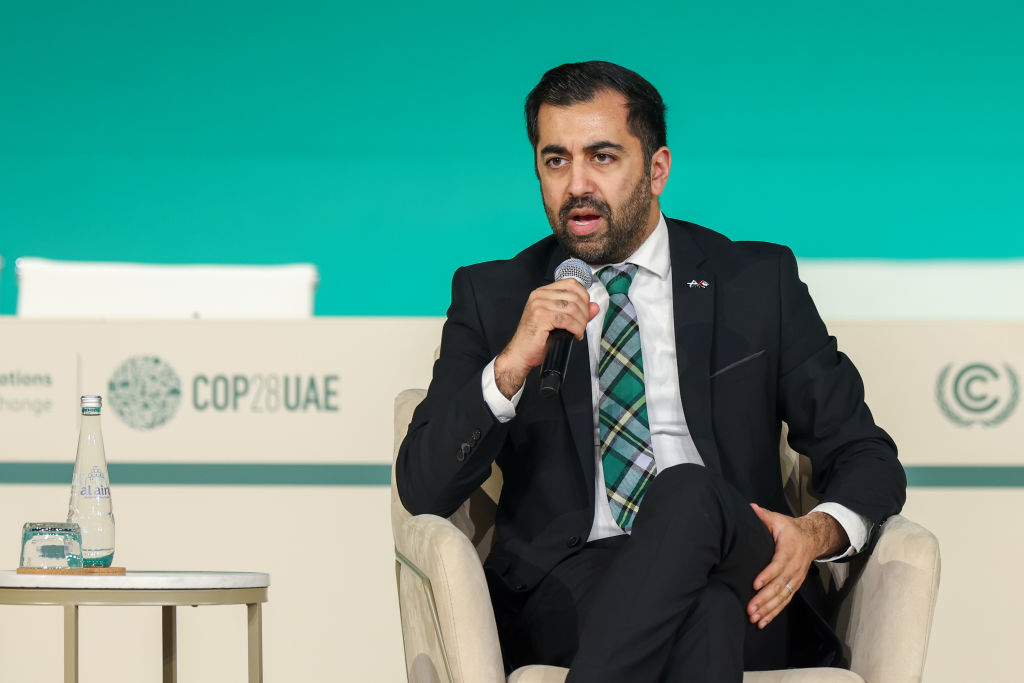For those who still believe in that old-fashioned thing called the British constitution, there has come a glimmer of hope from an unlikely source. Lord Cameron has threatened to withdraw Foreign Office support for overseas visits by Scottish government ministers if the SNP continues to disregard protocol on international jaunts.
Humza Yousaf raised eyebrows during COP28 when he shook hands and chatted with Turkish strongman Recep Tayyip Erdoğan. The SNP leader, who was at the event in his capacity as first minister of the Scottish government, tweeted out a photograph of the meeting and said they had discussed the situation in Gaza. In the same tweet, Yousaf called for an ‘immediate and permanent ceasefire’, which is at odds with the UK government’s position. Foreign affairs is supposed to be reserved to Westminster but the SNP government in Edinburgh isn’t terribly attentive to such constitutional niceties.
In a letter to Angus Robertson, the Nationalists’ grandly-titled ‘cabinet secretary for constitution, external affairs and culture’, the Foreign Secretary says the Scottish government failed to provide ‘sufficient advance notice’ to allow a Foreign Office official to be present at the Erdoğan tete-a-tete. In April, Cameron’s predecessor James Cleverly announced a crackdown on Scottish ministers holding meetings with foreign leaders and officials with no representative from the UK government in the room. The Nationalist administration at Holyrood would have to flag up any future bilaterals to facilitate the assignment of a Foreign Office official. In this instance, Cameron writes, ‘A UK official was available, whose contact details were known to your officials on the ground, but the location of the meeting was not shared with them.’
Citing previous breaches of the protocol, Cameron states that, should another occur, the Foreign Office will not facilitate any further overseas meetings and will ‘consider the presence of Scottish government offices in UK government posts,’ referring to the quasi-embassies that Holyrood is allowed to maintain in capital cities across the globe.
Yousaf’s meeting showed terrible political judgement. For one, his new friend Erdoğan says Israel is a ‘terror state’ while branding Hamas a ‘liberation group’. For another, given Erdoğan‘s unenviable human rights record, the friendly handshake drew criticism even inside the SNP. Roza Salih, a Kurdish-born Glasgow councillor who came to the UK as an asylum seeker, said she was ‘disappointed and disgusted’ by Yousaf meeting with a man who ‘kills Kurds in Turkey and does not respect human rights’.
But neither of those things will bother the SNP. The chance of having its burgeoning foreign affairs apparatus reined in will. As I’ve documented in the past, the Scottish government has been gradually developing and articulating an independent foreign policy for years now. It has its own nascent Foreign Office, the External Affairs Directorate, tasked with ‘protecting our place and interests in Europe’. It has its own international affairs blueprint, the ‘Global Affairs Framework’, which sets forth ‘the values, principles and priorities underpinning the Scottish government’s work to become more active internationally’. It is openly pursuing ‘diplomatic relations’ and ‘political links’ with China, Ireland, Germany and Canada.
Former first minister Nicola Sturgeon lobbied the German government in 2016 on ‘Scotland’s perspective’ on the EU; gave a speech in Dublin in 2017 pledging that ‘on virtually every issue of substance relating to Brexit, the Irish government… has an ally in Scotland’; and told the French National Assembly in 2019 that ‘the Scottish government is committed to the European Union’. As of 2021, the Scottish government was spending almost £6 million annually on its aforementioned overseas offices. In 2014, in his capacity as external affairs minister, Humza Yousaf called for an arms embargo on Israel, which then as now was engaged in a military operation against Hamas in Gaza.
Set against years of Scottish government provocation and empire-building, Lord Cameron’s mild rebuke does not go anywhere near far enough. Threatening to withdraw Foreign Office support and require the Scottish government’s embryonic consulates to find new office space is not an adequate response. UK government civil servants assigned to the Scottish government must be prohibited from engaging in activities related to foreign affairs without permission from Whitehall. If that doesn’t put a stop to Holyrood’s usurpation of Westminster’s foreign policy powers, parliament will have to consider legislative remedies. As prime minister, Cameron twice revisited the Scotland Act to expand Holyrood’s powers. If the government has to go back a third time, it should be to restrict them.







Comments